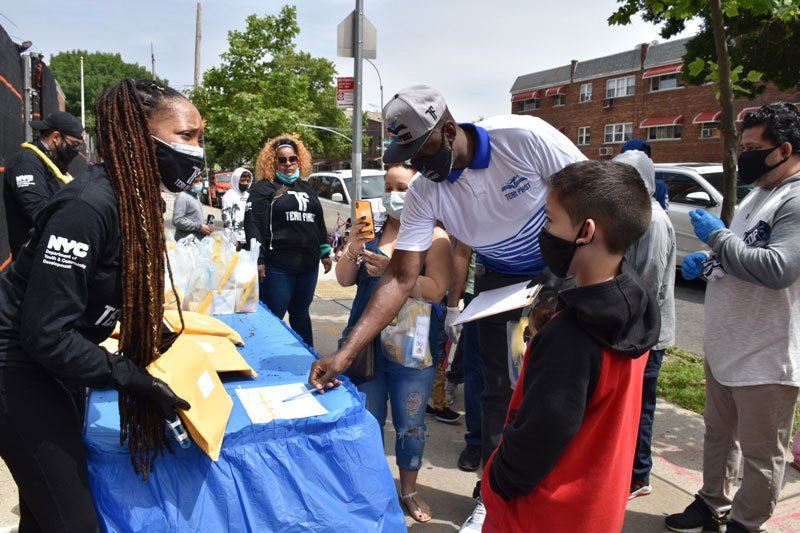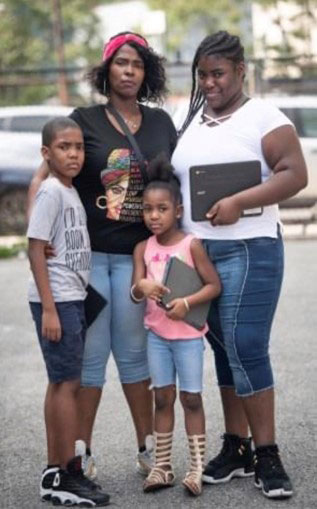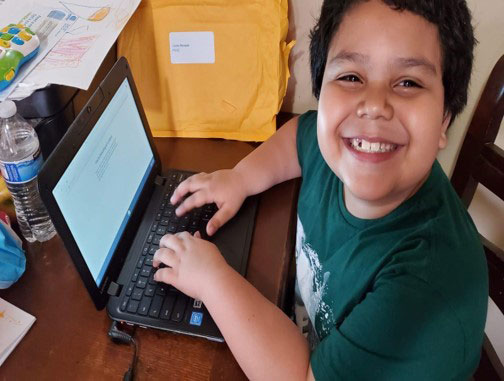
From hosting remote summer camp and distributing technology – nonprofit pivots quickly to meet the moment.
Athletics are a proven way to get kids involved with educational programs that boost success in the classroom. That’s why the Heisman Trophy Trust (yes, that Heisman Trophy) teamed up with The Trust to identify and support effective nonprofits helping New York kids succeed in sports and academics. Over three years, we’ve worked with the Heisman Trust to distribute more than $4 million to dozens of local organizations.
One of these organizations is Team First. Founded by former professional athlete Ty Grant, this NYC nonprofit has put grants to work expanding after-school creative writing and poetry classes, literacy instruction, and academic tutoring. It also created 24 basketball, flag football, soccer, and track teams for elementary school students.
In previous summers, Team First provided camps that mixed crafts with financial literacy, leadership development, robotics, and sports. When COVID struck, Team First received a grant through our NYC COVID-19 Response & Impact Fund.
“We knew we had to keep going,” said Dr. Yvette Morgan, executive director of the organization. “We found that students were having to rely on their cellphones to access remote classes. The digital divide isn’t something that we or these families can bridge ourselves.”

Distributing laptops and helping families get online was new territory, but necessary—a staggering 70% of the families served in the South Bronx do not have a home computer or laptop. With the $96,000 grant, it purchased new equipment, including laptops for staff so they could continue the work remotely. Throughout the spring, it gave 170 Chromebooks to students and families, along with fresh meals at sidewalk distribution sites.
For someone like Rayna Pasha,10, help from Team First was important as she tried to orient herself to a changed educational environment and the isolation that came from early stay-at-home orders.
“I knew things would be different when we found out classes were going remote,” Rayna said. “For a while, I couldn’t understand how to do remote classes, submit assignments, or do anything at all for school.”
Summer camp was a much-needed chance for recreation and social connection for Rayna. This year, she vlogged, made movies, cooked, and crafted, all from her home. She made a birthday video for a classmate and composed a video about the Black Lives Matter movement. The summer program also helped Rayna stay engaged as she made the transition to middle school.
Making the most of remote learning, Team First organized virtual visits to the Great Wall of China, the White House, and the San Diego Zoo. Roman Perez, a coach working with the nonprofit, organized virtual fitness boot camps and held a virtual meet-and-greet with baseball players in the Dominican Republic.
Team First attributes its success to its family-first approach.
“It was fun for the children to have something to do during the summer,” said Rayna’s mother, Lydia Rehman. “But Team First also answered my texts and phone calls anytime I had any questions.”
In response to the growing sense of emotional and psychological distress from school closures, the group provided resources and held forums and town hall meetings for families on coping with trauma during the difficult months.
“As much as the parents may want to send their children to school, there’s still a lot of fear around COVID-19,” said Morgan.

“We’re all going through this together,” Morgan continued. “I need to feel energy from children. I need to high-five kids. When I lost that, I kind of lost myself. So, if I struggle, I can only imagine what the families are going through.”
Though helping families and students fight emotional and psychological stress has been a priority, Team First has also had to adapt its athletic activities to be offered remotely.
“Sports are still a driver for these students, and they’re an important way to support children’s physical and mental health,” continued Morgan.
Coaches have had to drastically modify how they teach. In one instance, a soccer clinic has centered around just a small cone and soccer ball that students used to practice skills and strategies over Zoom.
Has remote learning and its resulting fatigue impacted how students are engaged with athletic activities? Not in the slightest, said Grant. “They do it. They do it in public housing, they do it outside of public housing. When they want to do it, they figure it out.” He added, laughing, “They’ll do it in their rooms as well and it might be the only days they clean their room.”
“We’re hopeful and optimistic that we can return to in-person competitive sports in the spring,” said Grant. “But in the meantime, we just want to be the glue that keeps them together.”